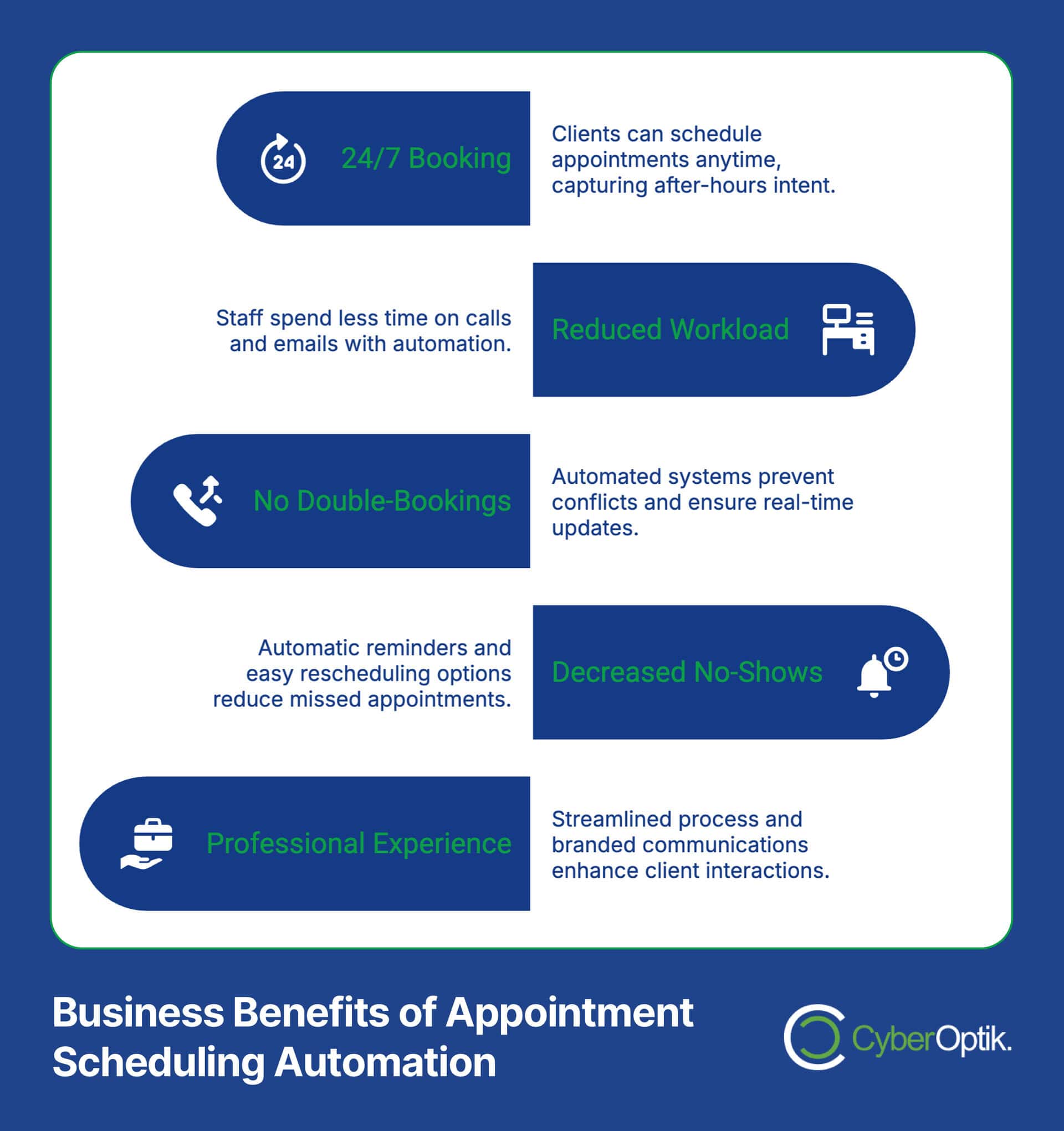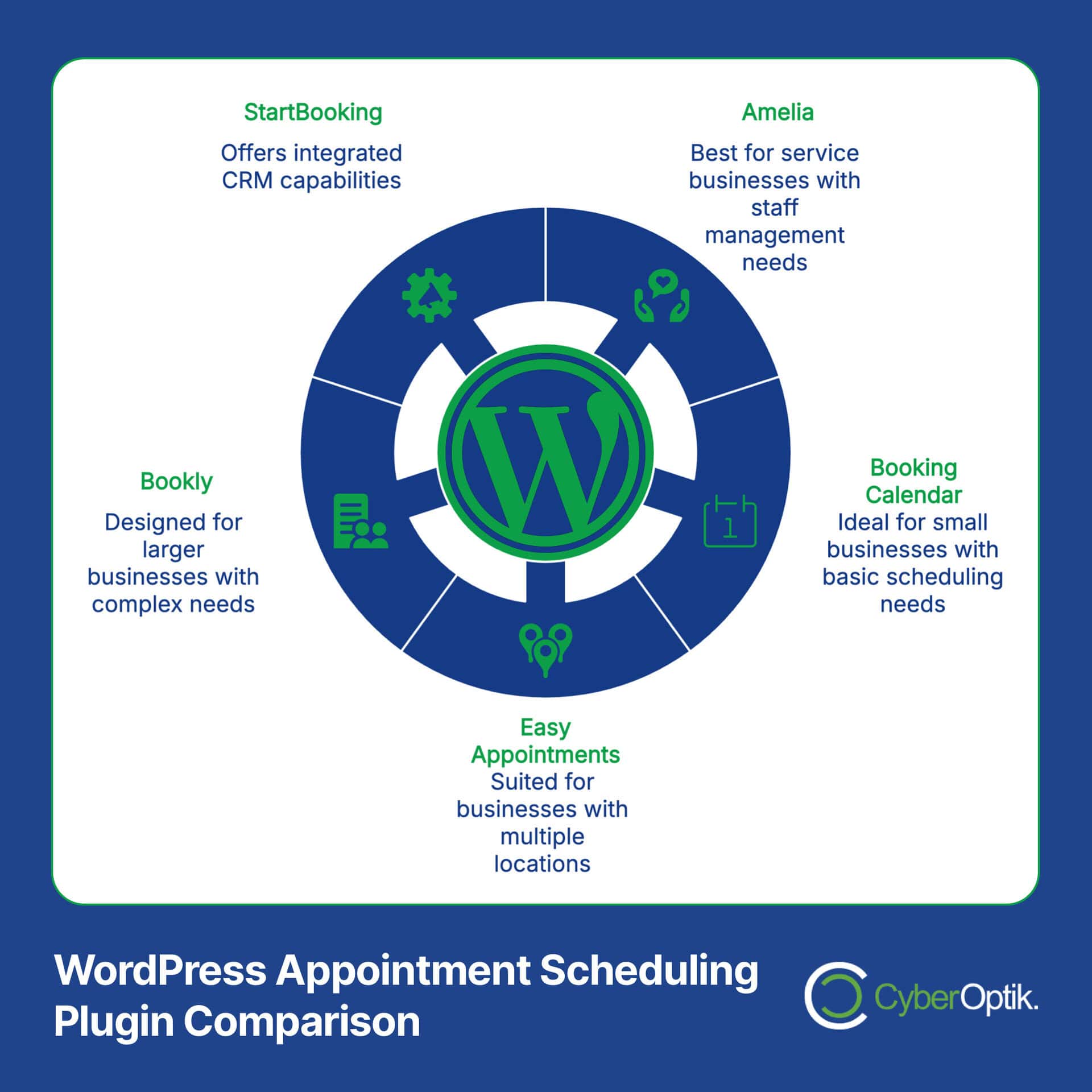Tired of the back-and-forth emails trying to schedule client appointments? You’re not alone. Manual booking systems drain time, create scheduling conflicts, and often lead to missed opportunities. Fortunately, there’s a better way.
For businesses using WordPress, appointment scheduling plugins offer a streamlined solution to these common challenges. These powerful tools automate booking processes. They eliminate double-bookings. They free up valuable time for more important tasks.
As a WordPress development agency working with Chicago businesses across multiple industries, we’ve implemented scheduling solutions for everyone from busy law firms to medical practices and consultants. We’ve learned what works. We’ve seen what doesn’t.
In this comprehensive guide, we’ll explore the best appointment scheduling plugins for WordPress. We’ll analyze key features, compare top options, and help you select the right tool for your specific business needs.
Why Your Business Needs an Appointment Scheduling Plugin
Scheduling matters for businesses. It directly impacts client satisfaction and operational efficiency. The right scheduling system transforms how clients interact with your company. It also reshapes internal workflows.

WordPress powers 43.6% of all websites on the internet today. (Source: Elegant Themes) This popularity creates a robust ecosystem of plugins for virtually any functionality. Appointment scheduling represents one of the most valuable plugin categories for service-based businesses.
What makes these tools so essential? Let’s examine the key benefits:
- 24/7 booking capabilities – Clients can schedule appointments anytime, not just during business hours
- Reduced administrative workload – Staff spend less time on phone calls and emails managing appointments
- Eliminated double-bookings – Automated systems prevent scheduling conflicts
- Decreased no-shows – Automatic reminders keep appointments top-of-mind
- Professional client experience – A streamlined booking process reflects well on your business
The business case becomes even clearer when considering the WordPress plugin ecosystem. With over 59,000 free plugins available in the WordPress directory, businesses have access to powerful solutions for virtually any need. (Source: WPBeginner) This extensive marketplace ensures competitive pricing and continuous improvement.
| Business Type | Scheduling Challenges | Benefits of Scheduling Plugins |
|---|---|---|
| Medical Practices | High volume, specific time slots, insurance verification needs | Patient pre-screening, insurance field collection, HIPAA compliance |
| Consultants | Varying appointment lengths, prep time needs | Buffer time between meetings, custom duration options |
| Salons/Spas | Multiple service providers, service-specific timing | Staff-specific bookings, service duration settings |
| Legal Services | Intake requirements, confidentiality concerns | Secure forms, client information collection |
The table above illustrates how different business types benefit from scheduling automation. Most service-based businesses find immediate improvements after implementation.
Key Features to Look for in Appointment Scheduling Plugins
Not all scheduling plugins offer the same functionality. The best choice depends on your specific business requirements. Before reviewing individual options, let’s examine the essential features to consider.
Security should top your priority list. This is especially crucial since 90% of WordPress vulnerabilities stem from plugins, not the core platform. (Source: HubSpot) Always select plugins with strong security track records and regular updates.
Essential Functionality
The core purpose of scheduling plugins is to facilitate bookings. However, the implementation details vary widely. Consider these foundational features:
- Calendar management – Multiple view options (daily, weekly, monthly) and staff calendar coordination
- Booking forms – Customizable fields to collect relevant client information
- Availability control – Define business hours, blocked time slots, and buffer periods
- Service definition – Create different appointment types with varying durations and pricing
- Staff management – Assign bookings to specific team members based on expertise or availability
User Experience Considerations
The booking process shapes client perceptions of your business. Prioritize plugins that offer a smooth, professional experience. Look for these user-focused features:
First, ensure mobile responsiveness. Booking interfaces should work flawlessly on smartphones and tablets. Many clients will attempt to schedule from mobile devices. A frustrating experience may cost you business.
Second, evaluate the number of steps required to complete a booking. Simpler is generally better. Each additional step in the process increases the likelihood of abandonment. The best plugins balance gathering necessary information with maintaining a streamlined process.
Integration Capabilities
Scheduling tools should connect seamlessly with your existing business systems. Look for these key integration points:
Calendar synchronization prevents double-bookings by maintaining consistency between your scheduling system and personal calendars. Google Calendar integration is particularly important. This ensures your team always has the most current schedule information regardless of which system they check.
Payment processing allows you to collect deposits or full payments during booking. This significantly reduces no-shows and strengthens commitment. Look for plugins supporting major payment gateways like PayPal and Stripe.
| Feature Category | Must-Have Features | Nice-to-Have Features |
|---|---|---|
| Booking Process | Calendar interface, time slot selection, form fields | Service selection filtering, location options |
| Notifications | Email confirmations, reminder emails | SMS reminders, custom notification schedules |
| Calendar Management | Business hours setting, buffer times | Multiple location support, seasonal hours |
| Integrations | Google Calendar, basic payment processing | CRM integration, marketing automation |
This feature categorization helps prioritize what matters most for your specific business needs. Focus first on must-have features, then consider nice-to-have options as tiebreakers between similar plugins.
Top Appointment Scheduling Plugins for WordPress

After evaluating dozens of options, we’ve identified the standout appointment scheduling plugins for WordPress. Each excels in different areas. The right choice depends on your specific business requirements and budget considerations.
With 63.1% of websites using a known CMS relying on WordPress, the platform’s plugin ecosystem continues to expand with robust scheduling options. (Source: ThemeIsle) This competitive marketplace drives innovation and quality improvements across all offerings.
Let’s examine how the leading plugins compare across key dimensions:
| Plugin Name | Pricing Model | Standout Features | Best For |
|---|---|---|---|
| Amelia | Premium ($79-$299/year) | Employee management, service-specific booking | Service businesses with multiple staff (salons, clinics) |
| Booking Calendar | Freemium ($60-$120/year) | Simple interface, availability calendar | Small businesses with basic scheduling needs |
| Easy Appointments | Freemium ($30 one-time) | Location-based booking, Google Calendar sync | Businesses with multiple locations |
| Bookly | Premium ($89-$449/year) | Extensive customization, powerful admin tools | Larger businesses with complex scheduling requirements |
| StartBooking | Subscription ($27-$47/month) | Client management, payment processing | Businesses seeking integrated CRM capabilities |
Now let’s look more closely at each solution to understand its strengths, limitations, and ideal use cases.
Amelia
Amelia stands out for service businesses with multiple staff members. Its intuitive interface makes it easy for clients to book with specific employees based on their expertise or availability. The plugin includes powerful notifications and reminders to reduce no-shows.
Key advantages include:
- Employee management with individual schedules and services
- Client dashboard for managing appointments
- Payment integration with major gateways
- Customizable booking rules and special days
The interface remains clean despite the advanced functionality. Clients can easily filter appointments by service, employee, or location. This reduces confusion and streamlines the booking process.
While Amelia excels overall, its premium-only model may not suit businesses with tight budgets. The WordPress development team has previously found the setup process more time-consuming than some alternatives, though the end result justifies the effort for businesses with staff-based scheduling needs.
Booking Calendar
Booking Calendar offers a straightforward solution for businesses with simpler scheduling needs. Its free version provides core functionality that suffices for many small businesses. The paid versions add valuable features like payment processing and advanced customization.
The calendar-first interface makes this plugin particularly intuitive. Visitors see available dates immediately and can click to select their preferred time. This directness appeals to users who dislike multi-step booking processes.
One limitation is the less sophisticated notification system compared to premium-only alternatives. However, the plugin’s simplicity and reliability make it a solid choice for businesses just starting with online scheduling.
Easy Appointments
Easy Appointments strikes a good balance between functionality and affordability. The free version offers location-based booking and Google Calendar synchronization – features often restricted to paid tiers in other plugins.
Multi-location businesses particularly benefit from this plugin’s structure. Customers can select their preferred location before viewing available times, streamlining the booking process.
The responsive design works well on mobile devices, ensuring a good user experience regardless of device. While the administrative interface lacks some refinement, the frontend booking experience remains smooth and professional.
Bookly
Bookly represents the most comprehensive solution in our comparison. Its extensive feature set includes everything from service extras and package bookings to custom fields and flexible cancellation policies.
The plugin’s strength lies in its adaptability to complex business requirements. For organizations with intricate scheduling needs, Bookly offers unmatched flexibility. The step-by-step booking wizard can be fully customized to match your brand and collect exactly the information you need.
This power comes with a steeper learning curve and higher price point. For simpler use cases, Bookly may offer more functionality than needed. However, businesses with complex scheduling requirements will find the investment worthwhile.
StartBooking
StartBooking takes a different approach by combining scheduling with client management features. This makes it particularly valuable for businesses that want to build ongoing relationships rather than just handling one-time appointments.
The subscription pricing model reflects its positioning as a business management tool rather than just a booking plugin. For the right business, the additional client management capabilities justify the monthly cost.
The clean, modern interface makes a positive impression on clients. However, the external hosting of booking data (rather than storing everything in your WordPress database) may concern some users regarding data ownership.
How to Choose the Right Appointment Scheduling Plugin
Selecting the best scheduling plugin requires matching features to your specific business needs. Start by analyzing your current booking process. Identify pain points and improvement opportunities. This creates a clear requirements list for evaluation.
Consider these key factors when making your decision:
Business Size and Complexity
Small businesses with straightforward scheduling needs generally benefit from simpler, more affordable solutions like Booking Calendar or Easy Appointments. The streamlined interfaces and focused functionality provide everything needed without overwhelming complexity.
Larger organizations or those with complex scheduling requirements should consider premium options like Bookly or Amelia. The additional investment pays off through better customization, advanced reporting, and more sophisticated customer management.
Technical Requirements and Compatibility
WordPress plugin compatibility matters significantly. The wrong plugin can slow your site or create conflicts with other tools you use. This is particularly important since 39% of hacked WordPress sites used outdated software. (Source: WPBeginner)
Before installation, verify the plugin:
- Receives regular updates (check the last update date)
- Is compatible with your WordPress version
- Works with your theme (check reviews for compatibility issues)
- Doesn’t conflict with other essential plugins you use
Also consider performance impact. Some feature-rich plugins may add significant load time to your site. This can affect both user experience and search engine rankings.
| Business Scenario | Recommended Plugin | Key Decision Factors |
|---|---|---|
| Solo practitioner (consultant, therapist) | Booking Calendar | Simplicity, calendar-focused interface, lower cost |
| Small team with shared scheduling | Easy Appointments | Staff management, Google Calendar integration |
| Service business with multiple staff (salon, clinic) | Amelia | Employee-specific bookings, service categorization |
| Multi-location business | Easy Appointments or Bookly | Location selection options, staff assignment |
| Business with complex scheduling rules | Bookly | Advanced customization, conditional logic |
This matching table provides starting recommendations based on common business scenarios. Your specific needs may vary, but this offers a useful framework for initial evaluation.
Implementation Best Practices
Installing a scheduling plugin is just the beginning. Proper setup and configuration significantly impact success. Follow these best practices to ensure optimal results from your chosen solution.
Installation and Configuration
Start with a clean, updated WordPress installation. This minimizes potential conflicts. Before activating your new plugin, create a complete backup of your site. This provides a restoration point if unexpected issues arise.
After installation, work through these configuration steps:
- Define business hours and availability with precision
- Create service categories and appointment types
- Set up staff profiles and availability (for multi-person businesses)
- Configure notification emails and reminder settings
- Test the booking process thoroughly before going live
Most implementation challenges occur during initial setup. Take time to properly configure all settings. This investment pays dividends through smoother operations later.
Testing Strategy
Thorough testing prevents client-facing problems. Create a systematic testing plan covering all aspects of the booking experience:
First, complete test bookings as if you were a new customer. This reveals usability issues that might not be apparent during setup. Pay close attention to the clarity of instructions and the overall flow.
Next, verify all confirmation and reminder emails. Ensure they contain accurate information and professional formatting. Test these across different email clients to check for display issues.
Finally, test on multiple devices. The booking experience should be equally smooth on desktops, tablets, and smartphones. Most clients now expect mobile-friendly booking options.
| Implementation Phase | Key Tasks | Estimated Time |
|---|---|---|
| Preparation | Requirements analysis, plugin selection, site backup | 1-2 days |
| Basic Setup | Plugin installation, business hours, services configuration | 1-2 days |
| Advanced Configuration | Staff setup, notifications, payment integration | 2-3 days |
| Testing | Cross-device testing, process verification, adjustments | 1-2 days |
| Launch | Go-live, monitoring, client communication | 1 day |
The implementation timeline above provides a general framework. Complexity varies based on your specific business requirements and chosen plugin.
User Training
Even the best system fails without proper user training. Ensure everyone who interacts with the scheduling system understands how to use it effectively. This includes both administrative staff and service providers.
Create documentation covering common tasks and processes. Include screenshots for visual clarity. Address how to handle special situations like cancellations, reschedules, and unusual booking requests.
With proper implementation and training, your scheduling system will deliver significant operational improvements and enhance the client experience.
Common Issues and Solutions
Even well-implemented scheduling systems occasionally encounter challenges. Understanding common issues and their solutions helps you address problems quickly and minimize disruption.
Technical issues typically arise from plugin conflicts, server limitations, or configuration errors. Business process problems usually stem from insufficient planning or user training gaps.
| Common Issue | Possible Causes | Recommended Solutions |
|---|---|---|
| Calendar sync failures | API credential issues, permission problems | Verify API connections, check permission settings, reauthorize calendar access |
| Double bookings | Sync delays, manual override errors | Implement buffer times, ensure all booking channels use the same system |
| Booking form submission errors | Required field configuration, form validation issues | Review form settings, simplify validation rules, check for browser compatibility |
| Email notification failures | SMTP configuration, email deliverability issues | Use an SMTP plugin, verify email templates, check spam settings |
| Site performance slowdown | Resource-intensive plugin functions, hosting limitations | Optimize WordPress with caching, upgrade hosting if necessary, limit active plugins |
The table above addresses the most frequent challenges businesses encounter. Most issues have straightforward solutions once properly diagnosed.
For ongoing success, implement regular maintenance checks. Schedule monthly reviews of your scheduling system to identify and address any developing issues before they affect clients.
Remember that plugins require updating like any software. Regular updates improve security and functionality while preventing compatibility problems with the WordPress core. Create a consistent update schedule to maintain optimal performance.
Going Deeper
For more general WordPress plugin information, explore our guide on how plugins enhance your WordPress site with additional functionality.
Conclusion
The right appointment scheduling plugin transforms both client experience and internal operations. By automating booking processes, these tools eliminate administrative busywork. They reduce scheduling errors. They provide 24/7 booking capabilities.
Your specific business needs should drive the selection process. Consider factors like team size, booking complexity, and integration requirements. The plugin comparison and recommendations in this guide provide a starting point for your evaluation.
Implementation success depends on careful planning and thorough testing. Follow the best practices outlined here to ensure a smooth transition. With proper setup, your scheduling system will deliver significant time savings and improved client satisfaction.
Need help implementing an appointment scheduling solution for your WordPress site? Our team specializes in WordPress development for Chicago businesses. We can help select, install, and configure the perfect scheduling solution for your specific needs. Contact us today to discuss your project.




